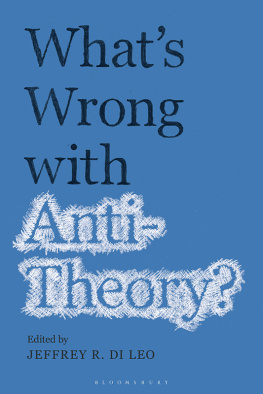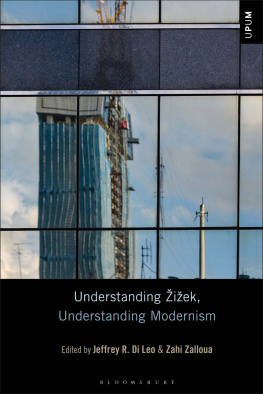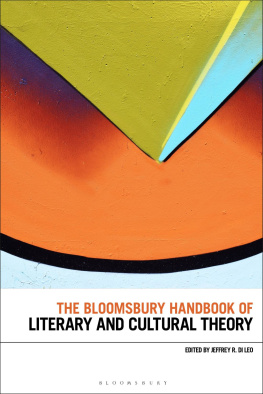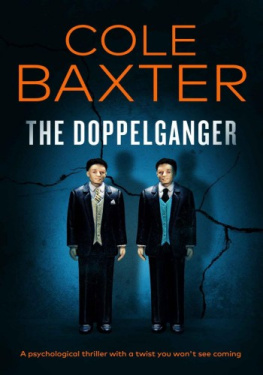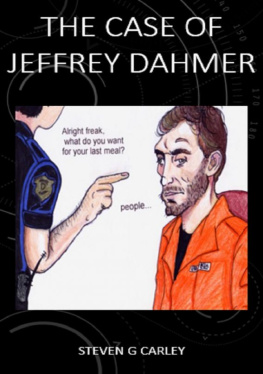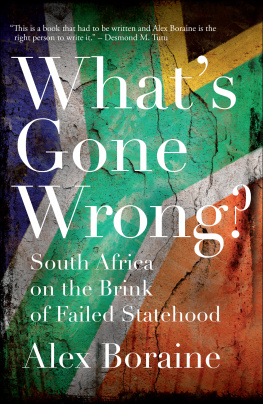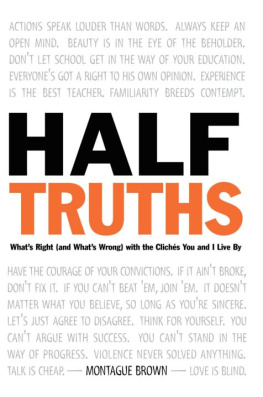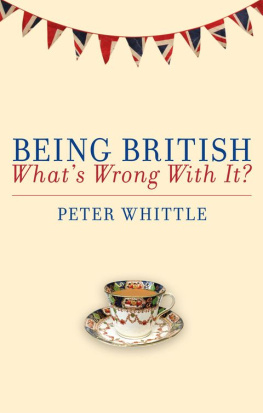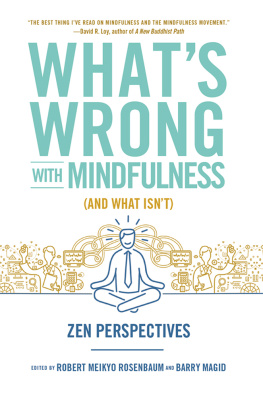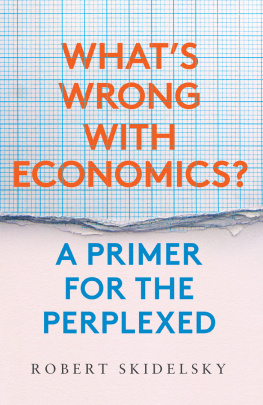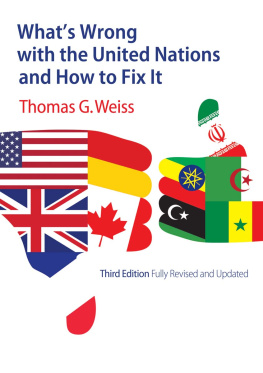Jeffrey R. Di Leo - Whats Wrong with Antitheory?
Here you can read online Jeffrey R. Di Leo - Whats Wrong with Antitheory? full text of the book (entire story) in english for free. Download pdf and epub, get meaning, cover and reviews about this ebook. publisher: Bloomsbury UK, genre: Politics. Description of the work, (preface) as well as reviews are available. Best literature library LitArk.com created for fans of good reading and offers a wide selection of genres:
Romance novel
Science fiction
Adventure
Detective
Science
History
Home and family
Prose
Art
Politics
Computer
Non-fiction
Religion
Business
Children
Humor
Choose a favorite category and find really read worthwhile books. Enjoy immersion in the world of imagination, feel the emotions of the characters or learn something new for yourself, make an fascinating discovery.
- Book:Whats Wrong with Antitheory?
- Author:
- Publisher:Bloomsbury UK
- Genre:
- Rating:4 / 5
- Favourites:Add to favourites
- Your mark:
- 80
- 1
- 2
- 3
- 4
- 5
Whats Wrong with Antitheory?: summary, description and annotation
We offer to read an annotation, description, summary or preface (depends on what the author of the book "Whats Wrong with Antitheory?" wrote himself). If you haven't found the necessary information about the book — write in the comments, we will try to find it.
Whats Wrong with Antitheory? — read online for free the complete book (whole text) full work
Below is the text of the book, divided by pages. System saving the place of the last page read, allows you to conveniently read the book "Whats Wrong with Antitheory?" online for free, without having to search again every time where you left off. Put a bookmark, and you can go to the page where you finished reading at any time.
Font size:
Interval:
Bookmark:
Whats Wrong with Antitheory?
Whats Wrong with Antitheory?
Edited and with an introduction by
Jeffrey R. Di Leo

BLOOMSBURY ACADEMIC
Bloomsbury Publishing Plc
50 Bedford Square,London,WC1B 3DP,UK
1385 Broadway,New York,NY 10018,USA
BLOOMSBURY, BLOOMSBURY ACADEMIC and the Diana logo are trademarks of Bloomsbury Publishing Plc
First published in Great Britain 2020
Copyright Jeffrey R. Di Leo and contributors, 2020
Jeffrey R. Di Leo and contributors have asserted their right under the Copyright, Designs and Patents Act, 1988, to be identified as Authors of this work.
For legal purposes the constitute an extension of this copyright page.
Cover design: Eleanor Rose
All rights reserved. No part of this publication may be reproduced or transmitted in any form or by any means, electronic or mechanical, including photocopying, recording, or any information storage or retrieval system, without prior permission in writing from the publishers.
Bloomsbury Publishing Plc does not have any control over, or responsibility for, any third-party websites referred to or in this book. All internet addresses given in this book were correct at the time of going to press. The author and publisher regret any inconvenience caused if addresses have changed or sites have ceased to exist, but can accept no responsibility for any such changes.
A catalogue record for this book is available from the British Library.
A catalog record for this book is available from the Library of Congress.
ISBN: HB: 978-1-3500-9611-0
ePDF: 978-1-3500-9612-7
eBook: 978-1-3500-9613-4
Typeset by Integra Software Services Pvt. Ltd.
To find out more about our authors and books visit www.bloomsbury.com and sign up for our newsletters.
every generation produces some individuals exceptionally preoccupied with theory.
William James (1911)
The antitheory message to Theory is clear: get back where you belong, the appreciation of literature. Put first things first. Reverse the tragic decline. Restore the canon. Fall in line. Declare your love for literature. I love literature. Say it loud, I LOVE LITERATURE.
Vincent B. Leitch (2019)
Christopher Breu is Professor of English at Illinois State University, where he teaches classes in critical theory and contemporary literature and culture. He is the author of Insistence of the Material: Literature in the Age of Biopolitics (2014) and Hard-Boiled Masculinities (2005). He is the coeditor of Noir Affect (forthcoming) and the recent Materialisms special issue of symplok. His work has also appeared in Cultural Critique, The Comparatist, Textual Practice, ELN, Callaloo, Twentieth-Century Literature, Humanities, Modern Fiction Studies, Men and Masculinities, and English Journal, among other places. He is currently at work on two monographs, one tentatively entitled, In Defense of Sex and the other, Infrastructure and Biopolitics.
Jeffrey R. Di Leo is Professor of English and Philosophy and Dean of the School of Arts and Sciences at the University of Houston-Victoria, USA. He is Editor of the American Book Review, Founding Editor of the journal symplok, and Executive Director of the Society for Critical Exchange and its Winter Theory Institute. His recent books include Corporate Humanities in Higher Education: Moving beyond the Neoliberal Academy (2013), Criticism after Critique: Aesthetics, Literature, and the Political (2014), Dead Theory: Death, Derrida, and the Afterlife of Theory (2016), Higher Education under Late Capitalism: Identity, Conduct and the Neoliberal Condition (2017), American Literature as World Literature (2017), Bloomsbury Handbook of Literary and Cultural Theory (2019), and The End of American Literature: Essays from the Late Age of Print (2019).
Tom Eyers is Associate Professor of Philosophy and English at Duquesne University. He is the author of three books: Lacan and the Concept of the Real (2012); Post-Rationalism: Psychoanalysis, Epistemology and Marxism in Postwar France (2013); and Speculative Formalism: Literature, Theory, and the Critical Present (2017). Recent writing has appeared in Critical Inquiry, boundary 2, Mediations, and Revue Internationale de la Philosophie. His next book has the title Romantic Abstraction.
Irving Goh is Presidents Assistant Professor of Literature at the National University of Singapore. He was recently Franke Visiting Faculty Fellow at the Whitney Humanities Center at Yale in the fall of 2018. His first book, The Reject: Community, Politics, and Religion after the Subject (2014), won the MLA Aldo and Jeanne Scaglione Prize for Best Book in French and Francophone Studies. His second monograph, Lexistence prpositionnelle, appeared in 2019. He is now completing his next monograph, Touching Literature, or the Experience of the Limit and working with Jean-Luc Nancy on a conversation book, The Deconstruction of Sex. His new project is on failure across French thought, affect theory, and contemporary literature.
Robin Truth Goodman is Professor of English at Florida State University. Her published works include: The Bloomsbury Handbook of 21st-Century Feminist Theory (edited collection, 2019); Promissory Notes: On the Literary Conditions of Debt (2018); Gender for the Warfare State: Literature of Women in Combat (2016); Literature and the Development of Feminist Theory (edited collection, 2015); Gender Work: Feminism After Neoliberalism (2013); Feminist Theory in Pursuit of the Public: Women and the Re-Privatization of Labor (2010); Policing Narratives and the State of Terror (2009); World, Class, Women: Global Literature, Education, and Feminism (2004); Strange Love, or How We Learn to Stop Worrying and Love the Market (cowritten with Kenneth J. Saltman, 2002); and Infertilities: Exploring Fictions of Barren Bodies (2001). She is currently editing another volume for Bloomsbury called Understanding Adorno, Understanding Modernism.
Christian P. Haines is Assistant Professor of English at Pennsylvania State University. He is the author of A Desire Called America: Biopolitics, Utopia, and the Literary Commons (2019) and the coeditor of a special issue of Cultural Critique, What Comes after the Subject? (2017). He is also a contributing editor for Angelaki: Journal of the Theoretical Humanities. Hes currently writing a book on finance and culture titled, The Scored Life.
Peter Hitchcock is Professor of English at the CUNY Graduate Center and Baruch College of the City University of New York. He is also on the faculty of Womens Studies and Film Studies at the Graduate Center. He is Associate Director of the Center for Place, Culture, and Politics at the Graduate Center. His books include Dialogics of the Oppressed (1992); Oscillate Wildly: Space, Body, and Spirit of Millennial Materialism (1999); Imaginary States: Studies in Cultural Transnationalism (2003); The Long Space: Transnationalism and Postcolonial Form (2010); The New Public Intellectual: Politics, Theory, and the Public Sphere (2016; coedited with Jeffrey R. Di Leo); Labor in Culture, or, Worker of the World(s) (2017); and, most recently, The Debt Age (2018; coedited with Jeffrey R. Di Leo and Sophia McClennen). His next project is called The World, The State, and Postcoloniality.
Paul Allen Miller
Next pageFont size:
Interval:
Bookmark:
Similar books «Whats Wrong with Antitheory?»
Look at similar books to Whats Wrong with Antitheory?. We have selected literature similar in name and meaning in the hope of providing readers with more options to find new, interesting, not yet read works.
Discussion, reviews of the book Whats Wrong with Antitheory? and just readers' own opinions. Leave your comments, write what you think about the work, its meaning or the main characters. Specify what exactly you liked and what you didn't like, and why you think so.

